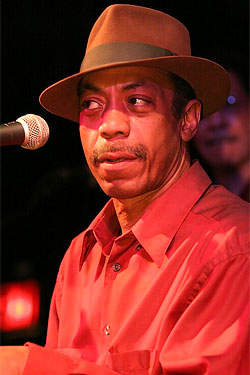
The jazz cornetist Olu Dara has been playing music professionally for nearly four decades, but chances are you know him from the 2004 Nas single ÔÇ£Bridging the Gap,ÔÇØ in which he turns in a cheery vocal performance alongside his son. Yep, aside from being a prominent member of New YorkÔÇÖs avant-garde seventies jazz scene, DaraÔÇÖs best-known achievement is siring one of hip-hopÔÇÖs greatest. Dara, who plays HarlemÔÇÖs Creole Restaurant tonight and tomorrow, spoke with Vulture about free jazz and little Nas.
HowÔÇÖd you end up in New York?
I got stranded in New York City. Well, I ran out of money. I wanted to go back to some of the places I had seen traveling in the Navy, and I stayed in New York a little bit too longa few days too longand I ran out of money. And here I am. That was 1964.
Eventually, you developed a reputation as a free-jazz musician.
I played in a lot of African bands, jazz bands, rhythm and blues bands, and when I decided to come across the river to Manhattan [from Brooklyn], thatÔÇÖs the first time I heard that kind of music.
You just happened to be really good at it?
Oh, I was very good at it. In those days, if you just had a horn, and hung around the music scene, you could get on a record and become famous! When I came to Manhattan to explore, I discovered how much respect a jazz musician could get.
How did you take the name Olu Dara?
A man who was an African priest, he had been reading his coconut shells through his deity. My name, in another world, in another life, was Olu Dara. ThatÔÇÖs how I got that name, and I kept it.
Was Nas creative from a young age?
I had a lot of faith in him as an artist, since he was a child. He drew his own comic book, illustration and story, at a very young age. And I know he enjoyed the books I read ÔÇö I had a lot of Eastern history and philosophy, and he read a lot about that. I remember always telling him, ÔÇÿread these books, read these books, read these booksÔǪÔÇÖ
He raps about that on ÔÇ£Bridging the Gap.ÔÇØ
He did? Okay. I should listen to the things he says. (laughs) So when he got a little older, things got rougher. The school system was bad and the community was getting real shaky, and so that was a hard period in his life. And so I decided to try and get him out of the system, and I told him, go make some money or whatever. Go west, young man! I knew he had enough talent to do what he wanted to do.
When you played on IllmaticÔÇÖs ÔÇ£LifeÔÇÖs a Bitch,ÔÇØ did you have any sense of what kind of reception the album would get?
I had no idea. He called and said, ÔÇÿcome on downÔÇÖ ÔÇö they turned the mikes on and they asked me to rap. And I said no, IÔÇÖm not gonna be known as the oldest rapper on Earth. And he said, ÔÇÿwell just play the horn on something,ÔÇÖ and thatÔÇÖs how that happened. As a matter of fact, we rode the subway there, and he left his lyrics on the train. He said, ÔÇÿI left my lyrics, damn, I left my lyrics.ÔÇÖ I knew that was his lifeÔÇÖs work right there. I think he just got in there and just improvised. I had no idea it would be an iconic disc.
He also raps about you, most notably on ÔÇ£Poppa Was a Player.ÔÇØ
Oh, I heard that in the street one day. Years ago, I was walking down the street, and I heard his voice, and I asked the guys on the stoop, who is that? They said, thatÔÇÖs Nas! Looking at me like an old man, ÔÇÿyou donÔÇÖt know about this shit.ÔÇÖ They said, ÔÇÿheÔÇÖs talking about his father Olu.ÔÇÖ And they kept listening. I said, ÔÇÿIÔÇÖm Olu.ÔÇÖ And they looked at me like, ÔÇÿget the hell out of here.ÔÇÖ

